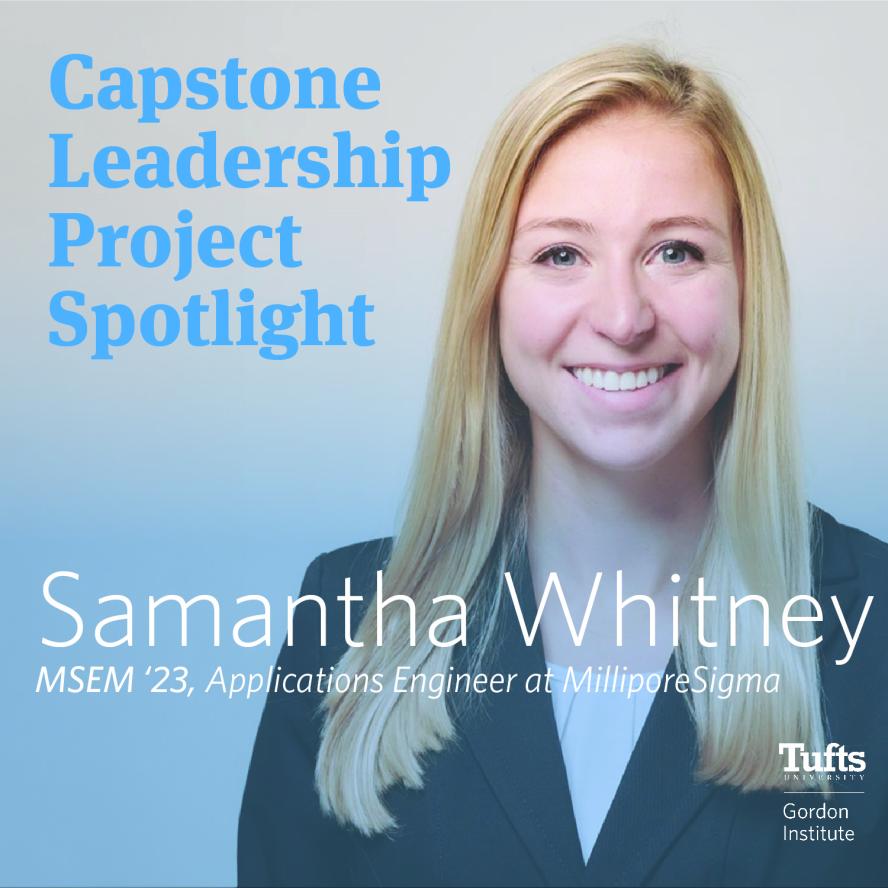Breadcrumb

Capstone Leadership Project Spotlight: Samantha Whitney, MSEM ‘23
The Capstone Leadership Project (CLP) is the culmination of Tufts Gordon Institute’s MS in Engineering Management (MSEM) program, where students apply their learning to a practical, relevant project for their current employer or a client organization. The CLP is an individual, student-led project that demonstrates an MSEM student’s business acumen and leadership skills in a real business setting with the support of an advising faculty member.
We interviewed MSEM students in order to share the stories behind their CLPs and celebrate the success of our students making an impact at their organizations. Here’s what Samantha Whitney, MSEM ‘23 and Applications Engineer at MilliporeSigma, had to say about her CLP and the MSEM program:
Why did you choose to study in the MSEM program?
I had been working for a couple of years and was considering returning to school to take the next step in my career. I initially looked at MBA and PhD programs, but had my reservations about both. An MBA seemed too focused on business without necessarily having a direct connection to my work as an engineer, while a PhD seemed to lean too heavily on the technical side–not to mention would be a large time commitment. When I saw how the MSEM program tackles business, strategy, technology, and leadership together, it stood out to me as a unique option that would be most relevant to my day-to-day activities at work.
How did your idea for your CLP originate?
My company was looking for individuals to join an innovation workstream, the goal of which was to find ways to leverage innovation within our organization to increase revenue. My boss also previously studied in the MSEM program and knew about the CLP requirement, and felt this new workstream would be a great opportunity to apply the skills learned in the program while completing the CLP.
What new skills or experiences were you hoping to gain through your CLP?
I was hoping to expand my capabilities at work, particularly when it comes to project management and business acumen. As this innovation initiative would bring together various divisions across my company, I thought it would also be a chance to increase my visibility at the higher level of the organization, learn more about these other divisions, and get a bit of leadership experience.
What did the process of planning then working on your CLP look like?
A lot of work went into defining my timeline for deliverables, contingency plans for that timeline, risk assessments, and ensuring my CLP was well aligned with the workstream activities. I had the chance to lead a subset of projects within the workstream, work with various division heads, and manage my subsection according to the timeline we had set up. Throughout the process, I was in communication with Frank Apeseche, my Tufts Gordon Institute advisor, and my industry sponsor.
Did you encounter any challenges during your CLP? How did you overcome them?
One phase of the project activities began to extend longer than scheduled, which impacted the timeline for both the workstream and my CLP. I connected with Frank and my industry sponsor for guidance on how the team could refocus efforts to accelerate subsequent phases of the project and complete our deliverables according to the timeline, which we successfully achieved.
How did your MSEM experience prepare you for–and assist you during– your CLP?
The MSEM coursework was highly relevant to my CLP. Since our goal was to increase revenue, there was a large financial component to the workstream, and the skills I had gained like interpreting financial statements were essential. In a way, my CLP was like a final exam for the program, but set in a real life situation with real stakes. In addition, outside of coursework, the friends I made in the program were a huge help. We would talk with each other about our CLPs, suggest solutions, celebrate our successes, and learn from one another.
What was the outcome of your CLP?
Although my CLP was focused on only the first phase of the workstream project, I’m continuing to lead my subsection and be a core team member to this day. My confidence in managing higher level projects has certainly increased as a result, and I’ve gained new skills in project management and increased my business acumen.
What was the biggest lesson you learned through your CLP?
One of the most interesting lessons to me was how projects gain ambiguity as you advance into senior roles. In a technical individual contributor role, you have a defined set of responsibilities that may require some creativity and ingenuity to overcome challenges. But in a more senior or leadership role, you’re often given a goal that is largely up to you to figure out how to achieve it. Figuring out the steps, iterating on ideas, and leading a team through that ambiguity requires a different mindset.